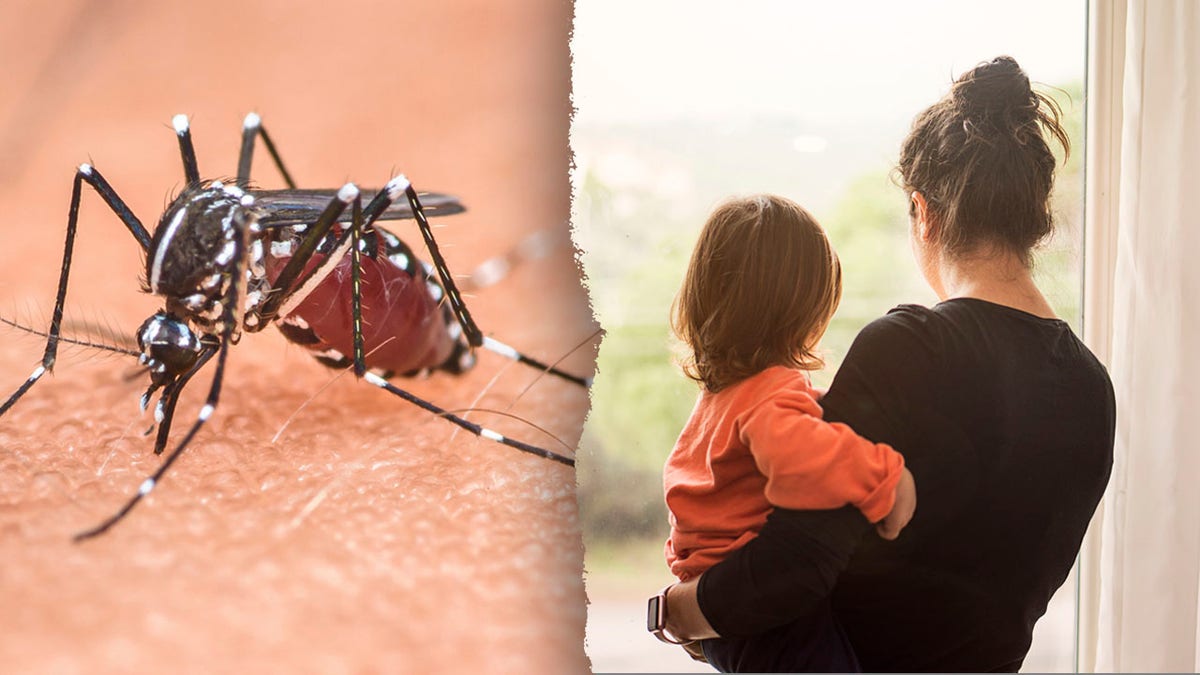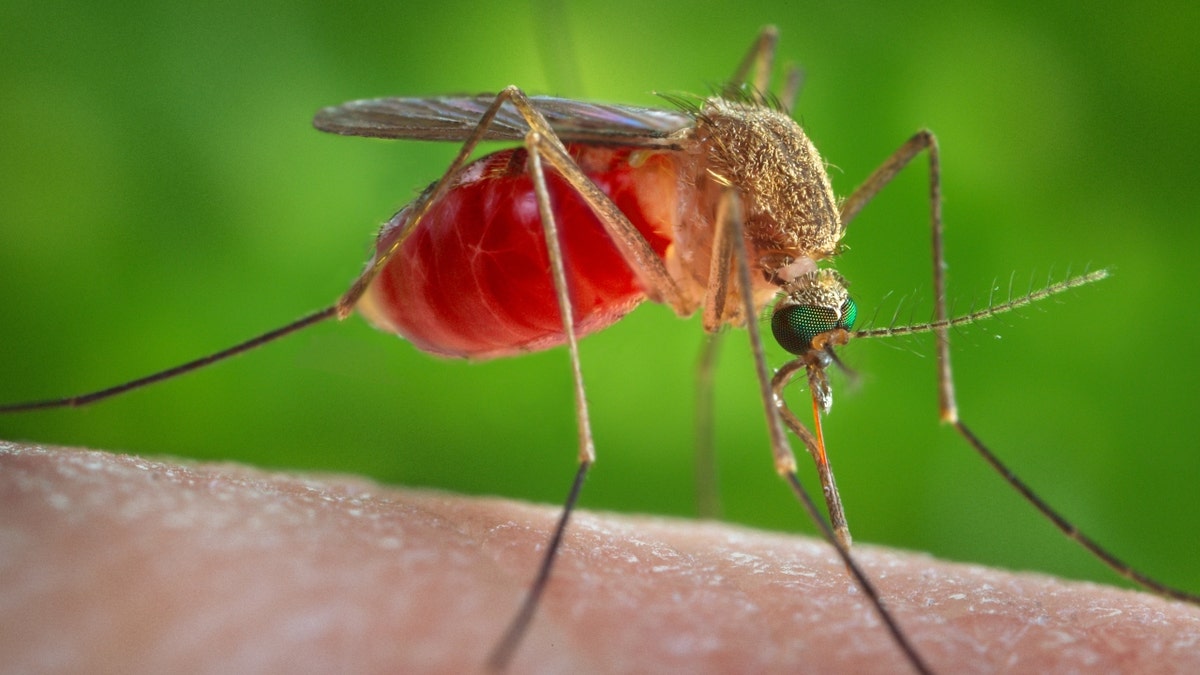Fox News Flash top headlines for August 23
Fox News Flash top headlines are here. Check out what's clicking on Foxnews.com.
Four Massachusetts towns — Douglas, Oxford, Sutton and Webster — have enacted a voluntary evening lockdown in an attempt to curb the spread of a potentially deadly mosquito-borne disease.
The decision comes after the Massachusetts Department of Public Health (DPH) confirmed the first human case of Eastern equine encephalitis (EEE) since 2020 in Worcester County.
On Wednesday, the Oxford Board of Health voted to support the recommendation for people to remain indoors after 6:00 p.m., effective immediately, through Sept. 30, according to a public health advisory shared with Fox News Digital.
SALMONELLA OUTBREAK CAUSED BY TINY TURTLES, CDC WARNS, WITH CASES ACROSS 21 STATES
Starting on Oct. 1, the recommendation is to remain indoors after 5:00 p.m. until the first hard frost.
The period from dusk through dawn is considered "peak mosquito hours," the notice stated.

Four Massachusetts towns — Douglas, Oxford, Sutton and Webster — have enacted a voluntary evening lockdown in an attempt to curb the spread of a potentially deadly mosquito-borne disease. (iStock)
The advisory designates the four communities as "critical-risk."
"It is the Board of Health’s responsibility to protect the public health, and we take EEE very seriously, and we are strongly encouraging residents to follow these recommendations due to the severity of EEE and the fact that it is in our community," a spokesperson for the town of Oxford said in an email to Fox News Digital.
PARVOVIRUS OR ‘SLAPPED CHEEK DISEASE’ IS ON THE RISE, CDC WARNS: HERE’S WHAT TO KNOW
"So far this year in Massachusetts, there has only been one human case of EEE, but throughout the state, mosquitoes have tested positive for EEE."
The infected person, who lives in Oxford, remains "hospitalized and courageously battling this virus," according to a Wednesday memo from the Oxford town manager that was provided to Fox News Digital.
The lockdowns are considered recommendations, and there will be no enforcement if residents do not comply, the town spokesperson said.

Eastern equine encephalitis is caused by a virus that is spread through the bite of an infected mosquito, according to the CDC, which describes it as a "rare but serious disease." (Reuters/CDC/James Gathany)
"We want to educate our residents about EEE and the seriousness of the illness and make them aware of the risk," the statement continued.
"However, if they want to use town fields outside these recommendations, they will have to show proof of insurance and sign an indemnification form."
WITH MPOX A PUBLIC HEALTH EMERGENCY IN AFRICA, WHAT YOU MUST KNOW ABOUT INCREASED VIRUS RISK
Oxford is working with the other three critical-risk communities, with all four issuing these same recommendations, the spokesperson confirmed.
"Schools are working to reschedule and adjust their sports schedules so practices and games occur before these evening times and on weekends," the email noted.
Fox News Digital reached out to Oxford Public Schools for comment.
What is Eastern equine encephalitis?
Eastern equine encephalitis is caused by a virus that is spread through the bite of an infected mosquito, according to the U.S. Centers for Disease Control and Prevention (CDC), which describes EEE as a "rare but serious disease."
"Eastern equine encephalitis can cause brain infection (encephalitis), which can be fatal."
Only a few cases are reported in the U.S. each year, most in the Eastern or Gulf Coast states, the agency states on its website.
Humans and other animals that contract the virus are considered "dead-end hosts," the CDC states, which means they can’t spread it to mosquitoes that bite them.

Older people and immunocompromised persons are at the highest risk for mosquito-borne encephalitis, an expert said. (iStock)
Common symptoms of EEE include fever, vomiting, diarrhea, headache, stiff neck, seizures, behavioral changes and drowsiness.
These usually appear five to 10 days after being bitten.
The disease can be deadly, resulting in fatalities for 30% of infected people. It can also lead to chronic neurological deficiencies, per the CDC.
'ZIKA-LIKE' MOSQUITO-BORNE VIRUS HAS SPREAD INTO EUROPE, HEALTH OFFICIALS WARN
"Eastern equine encephalitis can cause brain infection (encephalitis), which can be fatal," Edward Liu, MD, chief of infectious diseases at Hackensack Meridian Jersey Shore University Medical Center, told Fox News Digital.
Older people and those who are immunocompromised are at the highest risk for mosquito-borne encephalitis, according to Liu.

Prevention of mosquito bites is the most effective means of protecting against the disease, experts say. (iStock)
Dr. John Ayers, vice chief of innovation in the Division of Infectious Diseases and Global Public Health at the University of California, San Diego, confirmed to Fox News Digital that EEE is "serious but extraordinarily rare."
"Without any overt prevention measures, cases remain substantially rarer than being struck by lightning," he said.
Prevention and treatment
The fact that local mosquitoes have the virus and one Massachusetts patient has become infected is "concerning," Liu said.
CLICK HERE TO GET THE FOX NEWS APP
"While evening lockdowns could be protective, other options would be educating the public of the risk, encouraging mosquito repellent usage, and spraying to prevent the prevalence of mosquitoes," he advised.
Ayers added, "I don't think there is anything you can do to meaningfully lower your individual chances of illness, because they're already so low."
"These viral encephalitides have no treatment, so prevention and supportive care is the only course of action."
He agrees that typical strategies to deal with mosquito vector diseases are to kill the mosquitoes, reduce areas with standing water where they can nest and spray to kill their larvae.
CLICK HERE TO SIGN UP FOR OUR HEALTH NEWSLETTER
"These viral encephalitides have no treatment, so prevention and supportive care is the only course of action," Liu noted.
There is currently no vaccine for Eastern equine encephalitis.
For more Health articles, visit foxnews/health
Prevention of mosquito bites is the best way to prevent infection, the CDC confirmed.
Fox News Digital reached out to the CDC for additional comment.










































